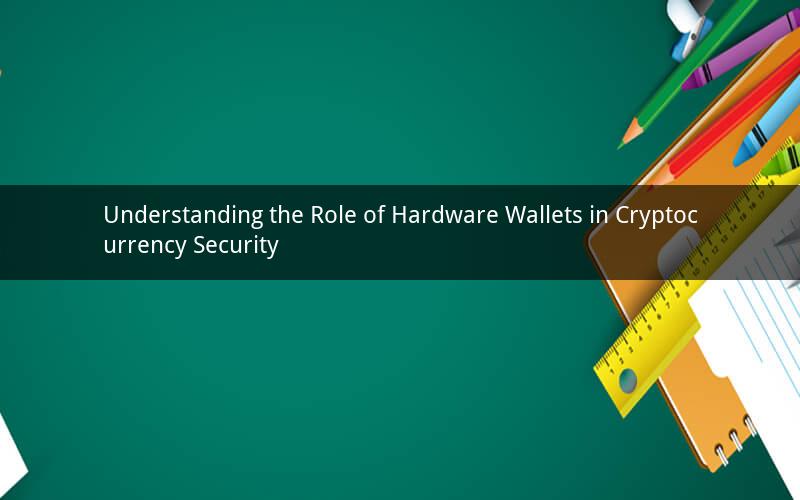
In the rapidly evolving world of cryptocurrencies, the need for robust security measures is paramount. One such measure is the use of hardware wallets, which have gained significant popularity among crypto enthusiasts. This article delves into the question, "Do I need a hardware wallet for cryptocurrency?" and explores the various aspects that make hardware wallets a vital tool for safeguarding your digital assets.
Hardware wallets are physical devices designed to store cryptocurrencies offline, offering an added layer of security compared to traditional online wallets. They work by generating and storing private keys offline, which are essential for accessing and transferring funds. This offline storage approach makes them immune to many online threats, such as phishing attacks and malware infections.
The primary advantage of using a hardware wallet is the enhanced security it provides. Unlike software wallets, which are susceptible to various online vulnerabilities, hardware wallets store your private keys in a secure, physical environment. This significantly reduces the risk of losing your cryptocurrencies to cybercriminals.
Furthermore, hardware wallets offer multiple security features that contribute to their robustness. They often come with a PIN code, which must be entered to access the wallet, adding an additional layer of protection. Some models even utilize a second factor authentication, such as biometric verification or a recovery seed, to ensure that only the rightful owner can access the funds.
Another advantage of hardware wallets is their compatibility with a wide range of cryptocurrencies. Many hardware wallets support multiple coins, including Bitcoin, Ethereum, Litecoin, and numerous altcoins. This versatility allows users to manage all their digital assets in one secure device, simplifying the process of storing and transferring funds.
While hardware wallets offer numerous benefits, it is important to consider whether they are necessary for your specific needs. Here are some factors to consider when deciding whether you need a hardware wallet for cryptocurrency:
1. The amount of cryptocurrency you own: If you have a significant amount of cryptocurrency, investing in a hardware wallet is a wise decision. The higher the value of your assets, the greater the risk of losing them to theft or fraud. A hardware wallet provides an extra layer of security to protect your investments.
2. Your level of risk tolerance: If you are risk-averse and prefer to keep your cryptocurrencies safe, a hardware wallet is an excellent choice. It offers a higher level of security compared to other storage methods, reducing the chances of losing your assets.
3. The types of transactions you perform: If you frequently engage in high-risk transactions, such as trading or lending, a hardware wallet can provide peace of mind. It helps protect your assets from potential online threats and ensures that your transactions are secure.
4. Your familiarity with technology: Hardware wallets require some technical knowledge to set up and use effectively. If you are comfortable with technology and willing to invest the time to learn how to use a hardware wallet, it can be a valuable addition to your cryptocurrency security strategy.
5. The cost: While hardware wallets can be expensive, they are a worthwhile investment if you prioritize the security of your cryptocurrencies. The cost of a hardware wallet is a one-time expense, and the benefits it provides can outweigh the initial investment over time.
Now that we have explored the benefits and considerations of using a hardware wallet, let's address some common questions about this technology:
1. Question: Can a hardware wallet be hacked?
Answer: While it is possible to hack a hardware wallet, the chances are significantly lower compared to other storage methods. The offline nature of hardware wallets makes them more secure against online threats such as malware and phishing attacks.
2. Question: Do I need to keep my hardware wallet connected to my computer all the time?
Answer: No, you do not need to keep your hardware wallet connected to your computer all the time. You can generate and store private keys offline, and only connect the wallet to your computer when you need to perform transactions.
3. Question: What should I do if I lose my hardware wallet?
Answer: If you lose your hardware wallet, you will lose access to your cryptocurrencies. To prevent this, it is crucial to keep your recovery seed safe and secure. The recovery seed allows you to restore your wallet and access your funds on a new device.
4. Question: Can I use a hardware wallet to earn interest on my cryptocurrencies?
Answer: No, a hardware wallet is solely designed for storing and securing your cryptocurrencies. It does not offer any features for earning interest or participating in other investment activities.
5. Question: Are there any alternatives to hardware wallets for cryptocurrency storage?
Answer: Yes, there are several alternatives to hardware wallets for storing cryptocurrencies, such as software wallets, mobile wallets, and paper wallets. Each option has its own advantages and disadvantages, and the best choice depends on your specific needs and preferences.
In conclusion, the question of whether you need a hardware wallet for cryptocurrency is a matter of personal preference and risk tolerance. While hardware wallets offer numerous benefits, they may not be necessary for everyone. If you prioritize the security of your digital assets and are willing to invest in a reliable storage solution, a hardware wallet is an excellent choice. However, it is important to consider the factors mentioned above and choose the storage method that aligns with your specific needs and circumstances.